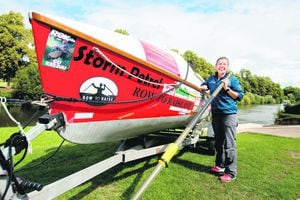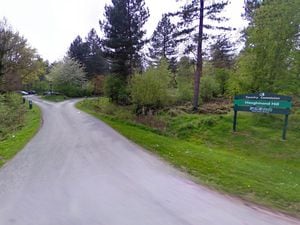Youngsters the motivation for Kelda's challenge
As we speak, Kelda Wood is preparing for Christmas. But there will be no roaring fire, mulled wine, or giant bronze turkey as portrayed in the television ads.

For Kelda, Christmas lunch will be a freeze-dried food ration, served from a small plastic pouch. She may raise a glass on the day itself, but it will be water – drawn from the sea, and filtered through her on-board desalination plant.
While millions of people will spend the festive season at home with their families, tucking into mince pies and probably watching dubious television, Kelda will be alone, in the middle of the Atlantic Ocean, battling the elements in boat only slightly bigger than a large family car. And if that were not enough, the 45-year-old also has to contend with a severe disability to her left leg, caused by an accident in a hay barn 16 years ago.
Today Kelda, who narrowly missed out on qualification for the 2016 Paralympics, embarks on Talisker Whisky Atlantic Challenge, described as the toughest rowing race in the world.
If successful, she will enter the history books as the first solo adaptive canoeist to make the 3,000 mile journey from La Gomera in the Canary Islands to the Caribbean island of Antigua.
It will be a remarkable achievement in anybody's book, and by her own admission, Kelda is 'not a sea person'. So whatever makes her want to do it?
As she contends with the huge waves, the danger, not to mention up to three months of solitude, one thing will keep her going to the bitter end – the burning desire to help other young people going through similarly traumatic experiences that she did as a 29-year-old.
"The whole point of the row is that I want to inspire people with physical and mental challenges so that they can find their answers a little bit quicker than I did," says Kelda, from Shrewsbury.
"I want to inspire people to have the confidence to go on their own journey."
She is hoping to raise £50,000 for Climbing Out, the charity she founded to make outdoor activities accessible to young people who have suffered life-changing disabilities. Among those she is supporting are children who were injured during the Manchester bombing.
During the row, which she expects to take between six and 12 weeks, Kelda will post a message each day on her website, dedicating the day's effort to a different young person who is battling with adversity back home.
"It's not about me," she says. "The whole aim is to get recognition for all the inspirational young people at home."
Kelda freely admits the challenge 'scares the pants' off her, and says she has no real idea of what to expect.
"You can have some pretty big falls in the Atlantic," she says, adding that waves of up to 26ft are not unusual.
"It's the most physical thing I have done in my life. You can end up going overboard, but the boat is self-righting, so as long as you clip yourself in properly, you should be all right.
"It all depends on the seas, but if you get big falls, obviously you can end up in the water."
She says she has little idea of how well she will cope with the challenge, and has made a conscious effort to not find out too much information.
"I might find that I love every minute of it, or I might hate it," she says.
"I will know when I get out there. The hardest thing for me was leaving my two dogs behind.
"But I love physical activity, and I love being in the outdoors, so I'm hoping that side of it will make up for the down sides."
And she says however tough she finds life on the open seas, it is unlikely to be as hard as it was recovering from her injury.
Before the accident, Kelda had enjoyed a career as a successful horse rider with ambitions to represent her country in the Olympics, and had also played netball at a national level. But in 2002 she was crushed beneath a one-ton bale of hay, which fell from the top of a stack, leaving her with a severe leg injury.
It looked for a while as if her leg would have to be amputated, and she says in some respects it would have been easier if that were the case.
"The leg injury changed everything, it left me unable to run," she says.
"I knew nothing about adaptive sports so I thought that was it for me, at the age of 29, and I lost a lot of confidence.
"I very nearly lost my leg and for a long time I wished I had because people couldn't see my injury so, when I didn't take part, I thought people assumed I was lazy.
"That was so far away from who I was.
"I spent years struggling to come to terms with my injury. I then climbed Kilimanjaro and had a life-changing experience – people said if I could do it with one gammy leg, they could do it with two.
"Then this whole new world opened up to me."
After battling back mentally and physically from the injury, Kelda turned her attention to water-based sports.
In January last year she became the first recorded female para athlete to reach the summit of Aconcagua, the highest peak in South America, and it was this that prompted her to sign up for the Atlantic challenge.
She said: "The race scares the pants off me, but I'm glad it does."
Many of the young people who take part in activities organised by Climbing Out
Miss Wood will also be drawing inspiration from the messages of support she has received from the children she works with at Climbing Out, outdoor activity programmes for youngsters recovering from life-changing injuries.
"These stories are so emotive," she said. "The day I'm either really struggling or having a brilliant time, I will relate it back to that person, to use their stories to motivate me. It's so powerful, very special.
"There have been so many monumental highs and crushing lows already, I feel I've been training for this my whole life nearly."
For more information, visit rowtoraise.com or donate at www.justgiving.com/fundraising/rowtoraise





